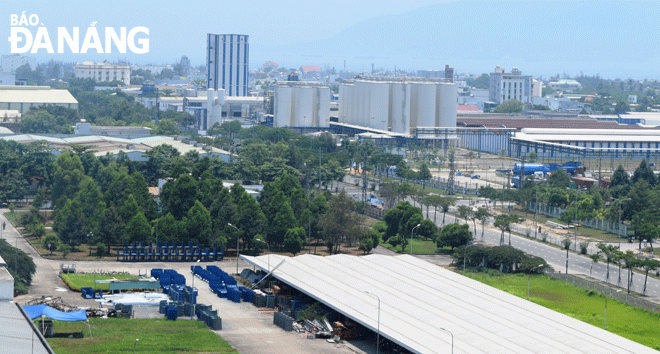Da Nang develops 'green' businesses, eco-industrial parks
That Da Nang businesses have been on track to go ‘green’ to meet environmental criteria is an important step that helps themselves ensure sustainable development, increase competitiveness, and deeply penetrate into global supply chains benefiting from free trade agreements in which Viet Nam is amongst signatories.
 |
| A corner of Hoa Khanh Industrial Park, which has been converted into an EIP on a trial basis since 2016 as part of the ‘Eco-industrial Park Initiative for Sustainable Industrial Zones in Viet Nam' project. Photo: HOANG HIEP |
Environmental protection, clean production
For many years, the 29-3 Textile and Garment Joint Stock Company has poured large amount of money into developing waste treatment facilities, building the clean green environment such as planting trees, flower beds, ornamental plants, lawns on its factory’s campuses as well as made commitment to using clean water, hygienic garbage bins, and not emitting untreated harmful waste into the environment.
Especially, since 2018, the company has put into operation a garment factory in Duy Trung Commune, Duy Xuyen District, Quang Nam Province. This factory has received a LOTUS BIO V1.1 certification granted by the Viet Nam Green Building Council for meeting the green building criteria.
This demonstrated the company’s efforts in the implementation of the sustainable development goals in addition to protecting the environment - one of the most important requirements set by the European market.
The certification, in fact, helps the company take advantage of opportunities from the Viet Nam - European Union Free Trade Agreement (EVFTA) and expand production capacity to boost exports to this large foreign market.
In fact, the EVFTA requires rules of origin to apply from fabric onwards, meaning that exports to the EU must use fabric produced in Viet Nam or the EU. The agreement also allows firms to use fabric from countries which have FTAs with both Viet Nam and the EU.
Chairman of the Board of Directors of the company Huynh Van Chinh said that the successful construction of the ‘green’ factory is an important goal in the company’s long-term development plan to ensure the improvement of competitiveness, enhance cooperation opportunities, develop commercial relationships with other partners and implement social responsibility, thereby contributing to maintaining the image and reputation of the company.
In order to make good use of opportunities from the signed FTAs, businesses in the fisheries sector must ensure that they fully and promptly meet many stringent requirements and regulations, including environmental sanitation.
The DA NANG SEAPRODUCTS CORPORATION, since 2020, has developed a solar power system with an area of 6,000m2 covering the entire ceiling area of the factory system and cold storage.
According to Mr. Tran Van Hung, the company’s Director, this solar power system not only ensures constant and stable power supply for the unit's production and trade activities, but it also avoids polluting the environment, and reduce electricity costs, one of the major input costs enterprises must pay.
In recent years, many businesses have taken the initiative to go ‘green’, especially when Viet Nam is focusing on entering FTAs. This is also the city's goal in the process of sustainable economic development.
 |
| Meeting environmental criteria is an important direction to help businesses ensure sustainable development. Production activities are observed at the 29-3 Textile and Garment JSC. Photo: KHANH HOA |
Taking multiple supportive solutions
Mr. Pham Truong Son, the Head of the Authority of Da Nang Industrial Park & Industrial Zones (IZs), said that the implementation of the eco-industrial parks (EIPs) model is an important task, thus contributing to the goal of building Da Nang into an environmentally-friendly city, thereby improving its competitiveness, attracting even more domestic and foreign investment, in line with the trend of global integration and development. However, building the EIP model is a long, tough journey.
In particular, the Hoa Khanh Industrial Park has been converted into an EIP on a trial basis since 2016 as part of the ‘Eco-industrial Park Initiative for Sustainable Industrial Zones in Viet Nam' project. It was jointly developed by the Vietnamese Ministry of Planning and Investment and the United Nations Industrial Development Organisation (UNIDO).
The deployment of this pilot project has helped the city use its resources efficiently, and promote cleaner production (RECP) in 29 companies operating in the Hoa Khanh IP.
Meanwhile, the Da Nang Hi-Tech Park has been emerging as an ecological urban area in the city. The venue is now home to many domestic and foreign employees and experts, and their family members.
In order to promote the construction of an EIP in the city, in the coming time, the Authority will strengthen the organisation of seminars during which businesses can seek cooperation opportunities with others to form circular systems that employ reuse, sharing, repair, refurbishment, remanufacturing and recycling to create a closed-loop system, minimising the use of resource inputs and the creation of waste, pollution and carbon emissions.
Besides, functional agencies will create favourable conditions for businesses to boost cooperation in forming industrial symbiosis networks for environmental protection and sustainable development.
In addition to taking advantage of the local funding, many industrial enterprises in Da Nang have received support from the Ministry of Industry and Trade to conduct assessment on cleaner production. Included are the Hoa Nhon Forest Product Processing Enterprise, Youth Force Paper JSC, Da Nang Forestry Export JSC, Ngu Hanh Son Cement JSC, A Chau Architecture and Trading Co., Ltd with a total funding of VND 250 million.
Reporting by KHANH HOA – Translating by A. THU